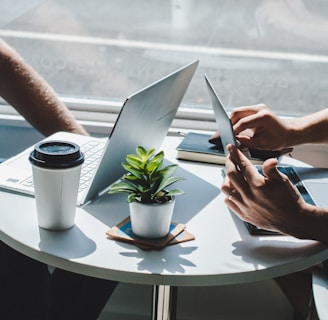Research the Company:
To prepare for an interview, conduct comprehensive research about the organisation. This entails knowing their goal, principles, and recent accomplishments. Explore their website, read news items, and view their social media accounts. Knowing the company's past not only allows you to customise your responses to their objectives, but it also demonstrates to the interviewer that you are truly interested in joining their team. Demonstrating this understanding will help you stand out from other applicants who may not have put in as much effort.
Understand the Role:
To impress the interviewer, you must have a thorough grasp of the position you are applying for. Examine the job description carefully, noting the most important tasks and requirements. Consider how your previous experiences, talents, and successes connect to these responsibilities. Prepare to explain why your history makes you an excellent candidate for the role. This not only demonstrates that you are serious about the work, but also that you can envision yourself functioning effectively in the capacity, reassuring the interviewer of your dedication and preparation.
Practice Common Questions:
Preparing for an interview involves practicing typical questions. Frequently asked questions are "Tell me about yourself," "Why do you want to work here?" and "What are your strengths and weaknesses?" Crafting and practicing your responses to these questions can help you react clearly and concisely. Practicing reduces nervousness and allows you to express yourself more clearly, leaving a good impression on the interviewer. Remember to include examples that demonstrate your job-relevant talents and experiences.
Practice Common Questions:
One of the most effective strategies to prepare for an interview is to practise answering common questions. Frequently asked questions are "Tell me about yourself," "Why do you want to work here?" and "What are your strengths and weaknesses?" Crafting and practicing your responses to these questions can help you react clearly and concisely. Practicing reduces nervousness and allows you to express yourself more clearly, leaving a good impression on the interviewer. Remember to include examples that demonstrate your job-relevant talents and experiences.
Prepare Your Own Questions:
Interviews are two-way street, and preparing your own questions demonstrates your initiative and genuine interest in the position. Asking thoughtful questions about the company's culture, the people you'll be working with, and the role's requirements indicates your excitement and interest. It also offers you with useful information for determining whether the organisation is a good fit for you. Thoughtful questions may create an impact on the interviewer by demonstrating your readiness and involvement.
Dress Appropriately:
First impressions are generally created within the first few seconds of meeting someone, therefore dressing appropriately for the interview is vital. Dressing adequately entails choosing professional apparel that is consistent with the company's dress policy. If you're undecided, it's best to go with the somewhat more formal option. Your appearance should reflect respect for the opportunity and the firm. Being well-groomed and dressed adequately boosts your confidence and communicates to the interviewer that you take the interview seriously.
Arrive on Time:
Punctuality is an obvious reflection of your professionalism and dependability. Plan on arriving at least 10-15 minutes early for your interview. This buffer time accounts for any unexpected delays, such as traffic or difficulty reaching the place. Arriving early also allows you to gather your thoughts and alleviate any pre-interview anxiety. Being timely demonstrates respect for the interviewer's time and creates a favourable tone for the remainder of the interview.
Practice Good Body Language:
Nonverbal communication influences how you are regarded during an interview. Make solid eye contact, give a firm handshake, and sit up straight. These behaviours demonstrate confidence and attentiveness. Avoid negative body language, such as crossing your arms, slouching, or fidgeting, since these might signal anxiousness or indifference. Positive body language may help you connect with the interviewer and support the vocal words you're delivering.
Listen Carefully:
Active listening is critical during an interview. Pay great attention to the interviewer's questions and comments, and make sure you completely understand them before answering. This demonstrates respect and awareness. Avoid interrupting others and respond thoughtfully and straight to the question. Active listening also helps you to catch up on tiny clues about the interviewer's preferences, which can help you adapt your replies more effectively. Participating completely in the conversation indicates your communication abilities and enthusiasm for the position.
Showcase Your Achievements:
Interviews are your opportunity to highlight your accomplishments and the value you bring. Use specific examples from your past experiences to demonstrate your skills and successes. Discussing tangible achievements, such as projects completed, goals met, or awards received, provides concrete evidence of your capabilities. Tailor these examples to the role you’re applying for to show how your background makes you a perfect fit for the position. This approach not only boosts your credibility but also helps the interviewer see your potential contributions to their team.
Follow Up:
Sending a thank-you email following the interview is a polite and professional gesture that can distinguish you from other applicants. In your email, thank them for the chance to interview, repeat your enthusiasm for the position, and briefly emphasise how your talents and experiences make you a good fit. This follow-up demonstrates that you value the interviewer's time and reiterates your interest in the position. It's a simple yet powerful approach to make a good first impression and maintain your candidature on people's minds.
To ace your job interview, thoroughly research the company and understand the role you're applying for. Practice answering common questions and prepare your own insightful questions to ask the interviewer. Dress appropriately, arrive on time, and use confident body language. Actively listen during the interview and showcase your achievements with specific examples. Finally, send a thank-you email to express your gratitude and reiterate your interest in the position.




